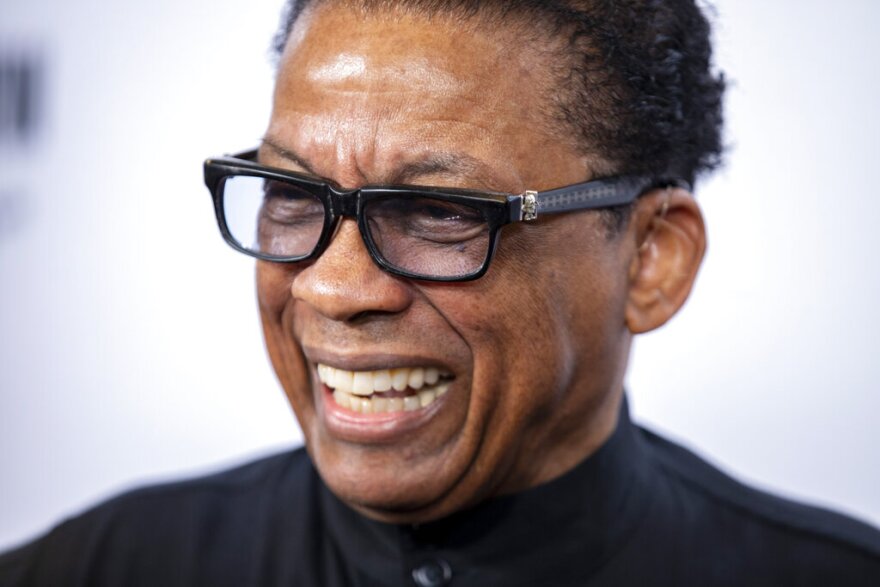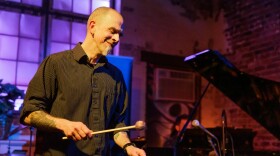A theme among many great jazz musicians, is that of child prodigy. And like many child prodigies, pianist Herbie Hancock's early formal training was in classical music. He performed a Mozart piano concerto with the Chicago Symphony Orchestra at age 11.
It was in high school that he began performing jazz, initially influenced by Oscar Peterson and Bill Evans. He also developed a passion for electronics and science, and double-majored in music and electrical engineering in college. Later in Hancock’s career, we would see these two passions unite.
The great trumpeter Donald Byrd is credited with discovering Hancock’s jazz talent in 1960. Three years later, that talent presented him with two life-changing opportunities: His first solo album and an invitation to play with another great trumpeter, Miles Davis. He invited Hancock into what would become his second great quintet. With Miles, he was featured on many classic recordings, including "ESP" and "Nefertiti," and later on Davis’ groundbreaking "In a Silent Way."
Herbie’s own solo career has covered some musical ground. Remember that first album in 1963? It was prophetic with the title Takin’ Off and included his first hit – “Watermelon Man.” His first eight records were for the Blue Note label and included the classic albums Maiden Voyage and Speak Like a Child.
By the '70s, fusion jazz was folding rock into the genre with more electronic instruments inspiring new sounds, and Hancock was at the forefront. He assembled The Headhunters and in 1973 their album Head Hunters, with its hit “Chameleon,” became the first jazz album to go platinum. By mid-decade, Herbie was playing for stadium-sized crowds all over the world. He had 11 albums in the pop charts that have since provided samples for generations of hip-hop and dance music artists.
In the '80s found him working all sides of his passion for jazz, introducing Wynton Marsalis to the world by producing his debut album. Hancock did a series of collaborations with bassist Bill Laswell, kicking off with Future Shock and the single “Rockit” that lit up the dance and R&B charts and led to an R&B Grammy. Then, in 1986, Hancock won an Oscar for scoring the film Round Midnight.
Hancock lives comfortably with the duality of acoustic jazz and electronic music. The '90s began a string of Hancock-led collaborations with a theme of large productions and duets that has taken him into the 21st century.
Dis is Da Drum project included 29 musicians. He formed another all-star band to record The New Standard. There was an album of duets with his longtime friend, Wayne Shorter. He reunited with The Headhunters in the same year he released Gershwin’s World, which included collaborators from the pop and jazz worlds.
Hancock kicked off the 2000’s with another Laswell collaboration and included young hip-hop and techno artists on FUTURE2FUTURE. He also joined with Roy Hargrove and Michael Brecker to record a John Coltrane tribute. The album Possibilities followed in 2005, once again teaming Herbie with many popular artists. And in 2007, the album River: The Joni Letters, a tribute to longtime friend and collaborator Joni Mitchell, won three Grammy Awards, including Album of the Year.
The next album took two years, seven continents and dozens of musicians. The critically-acclaimed, The Imagine Project, features a stellar group of musicians including Jeff Beck, The Chieftains, Lionel Loueke, Oumou Sangare, Tedeschi Trucks and Tinariwen. In pure Hancock form, it won Grammy Awards for Best Pop Collaboration and Best Improvised Jazz Solo.
The Imagine Project also expressed another side of Herbie Hancock. It utilized the universal language of music to express its central themes of peace and global responsibility.
Hancock currently serves as chairman of the Herbie Hancock Institute of Jazz. He’s the founder of the International Committee of Artists for Peace. In 2011, he was designated a UNESCO Goodwill Ambassador and leads up the International Jazz Day celebrations. He's the recipient of a Kennedy Center Honor, won 14 Grammys, and in 2016 was awarded the Grammy Lifetime Achievement Award.








